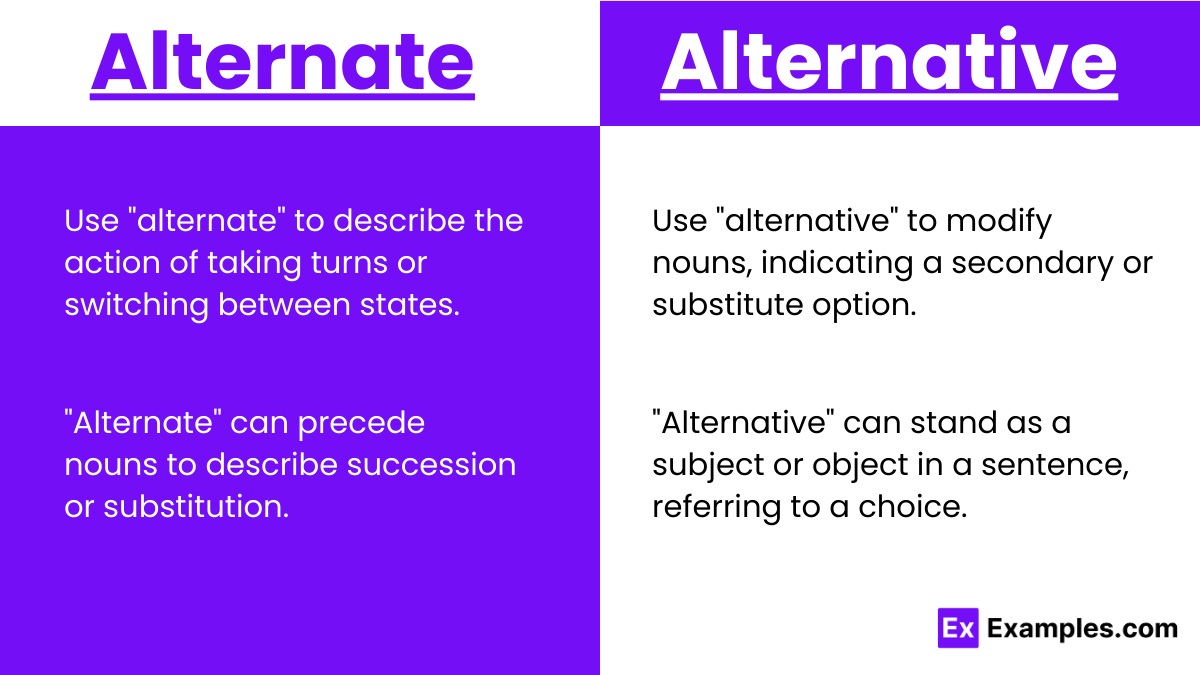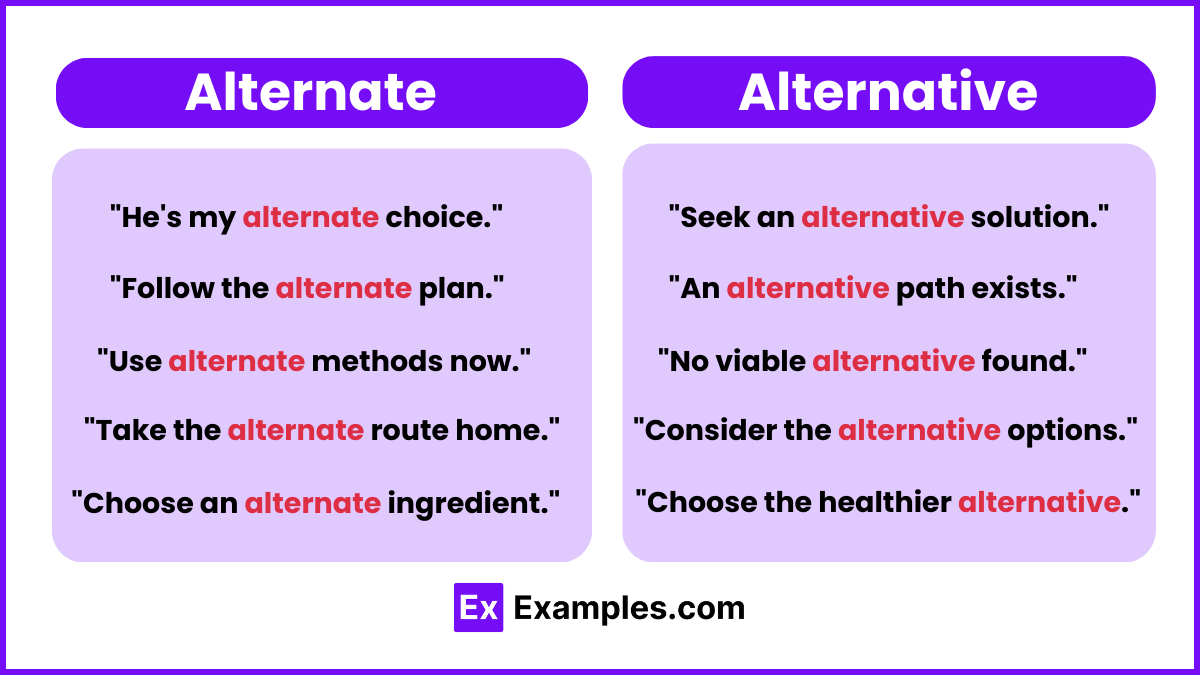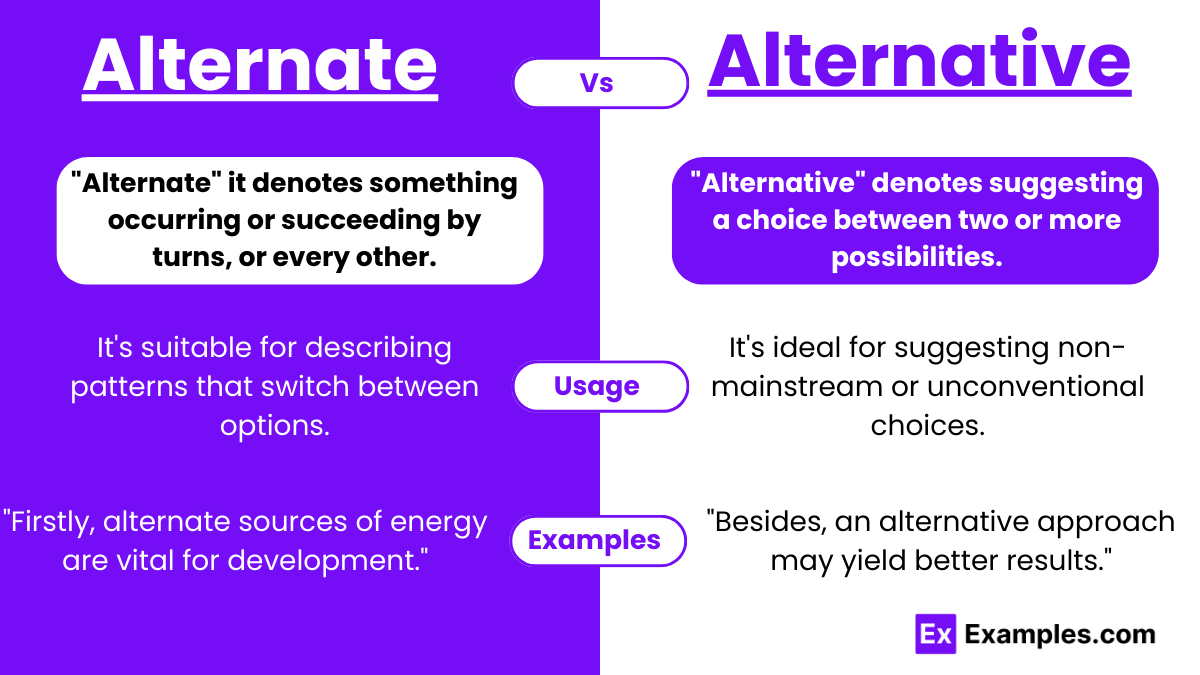Alternate vs Alternative – Meanings, Difference, Examples, Usage
Sometimes in English, words can seem really similar but mean different things. “Alternate” and “alternative” are two such terms that, despite their apparent similarity, serve unique functions within sentences. This guide is designed to illuminate the distinct applications of these words, aiding in their correct usage. Whether it involves choosing an “alternate” path or considering an “alternative” strategy, a clear understanding of these terms can significantly enhance the precision of your communication.
Alternate and Alternative – Meanings
- Alternate: The term “alternate” is primarily used as an adjective or verb. As an adjective, it denotes something occurring or succeeding by turns, or every other. As a verb, it refers to the act of switching between two or more things in a repeated sequence.
- Alternative: “Alternative” functions as a noun or adjective, suggesting a choice between two or more possibilities. It often implies a substitute or secondary option that becomes relevant when the primary choice is unavailable or undesirable.
Summary
“Alternate” embodies the concept of a cyclic succession, such as “alternate layers of material.” It also captures the essence of serving as a substitute, like an “alternate juror.” “Alternative,” on the other hand, presents itself as a choice among possibilities, offering a different route or option when faced with a decision, as in “an alternative plan.” Grasping the distinction aids in precise expression, whether discussing options, solutions, or sequences.
How to Pronounce Alternate and Alternative
- Alternate: Pronounced as /ˈɔːltərnət/ (AWL-ter-nate).
- Alternative: Pronounced as /ɔːlˈtɜːrnətɪv/ (awl-TUR-nuh-tiv).
The pronunciation differs notably in the stress patterns and the ending sounds, with “alternate” emphasizing the first syllable and “alternative” stressing the second.
Differences between Alternate and Alternative
| Aspect | Alternate | Alternative |
|---|---|---|
| Grammatical Role | Adjective, Verb | Noun, Adjective |
| Formality | Common in both formal and informal contexts | Used across formal and informal settings |
| Usage | Denotes succession by turns, serves as a substitute | Indicates a choice among possibilities, often serves as a substitute or secondary option |
| Context | Sequence, rotation, substitution | Choice, option, substitute |
| Nuance | Suggests a cyclical pattern, alternation | Implies availability of other options, often in the context of a preferable or different choice |
How to Remember the Difference between Alternate and Alternative
To distinguish between “alternate” and “alternative,” associate “alternate” with the pattern of succession or rotation, like “alternate days.” Think of “alternative” in terms of options and choices, particularly when the primary option is unsuitable or unavailable, such as “alternative energy sources.”
When to Use Alternate and Alternative

Usage of Alternate
- Describing a Sequence: Use “alternate” when talking about something happening in turn or by rotation, like “alternate layers” in a cake.
- As a Substitute: “Alternate” is appropriate for someone or something that serves as a backup, such as an “alternate juror” in court.
- In Patterns: It’s suitable for describing patterns that switch between options, like “alternate stripes” of color.
- Scheduling: When events occur on every other basis, such as “alternate weekends,” “alternate” is the correct choice.
- Cycling Options: Use “alternate” to discuss options that are used in rotation, such as “alternate routes” for travel.
Usage of Alternative
- Choice Between Options: “Alternative” is used when presenting different options or solutions, as in “alternative plans.”
- Non-Standard Options: It’s ideal for suggesting non-mainstream or unconventional choices, like “alternative medicine.”
- Secondary Option: When there’s a need to indicate a backup or plan B, “alternative” is the right term, as in “an alternative venue.”
- Preference: Use “alternative” to express a preference for one option over another due to constraints or personal choice.
- Substitutes: When discussing a replacement option that might not be similar to the original, “alternative” is used, like in “alternative energy sources.”
How to Use Alternate and Alternative
Alternate
- As an Adjective: “Alternate” can precede nouns to describe succession or substitution.
- Example: Alternate routes were taken due to the road closure.
- As a Verb: Use “alternate” to describe the action of taking turns or switching between states.
- Example: The lights alternate between red and green.
Alternative
- As a Noun: “Alternative” can stand as a subject or object in a sentence, referring to a choice.
- Example: The alternative to the proposed plan was much more cost-effective.
- As an Adjective: Use “alternative” to modify nouns, indicating a secondary or substitute option.
- Example: Alternative medicine often incorporates holistic practices.
Alternate and Alternative – Examples

Examples of Alternate
- Firstly, alternate sources of energy are vital for sustainable development.
- Moreover, the conference will feature speakers on alternate days.
- On the other hand, using alternate materials can reduce costs.
- Additionally, she was appointed as the alternate chairperson.
- Finally, consider alternate methods to resolve this issue.
Examples of Alternative
- Firstly, exploring alternative therapies can offer new hope.
- Besides, an alternative approach may yield better results.
- Conversely, without a viable alternative, we must proceed as planned.
- Furthermore, alternative music genres are gaining popularity.
- In conclusion, seeking alternative opinions can broaden perspectives.
Synonyms
| Term | Synonyms |
|---|---|
| Alternate | Substitute, Secondary, Rotating, Intermittent, Successive |
| Alternative | Option, Choice, Substitute, Plan B, Variant |
Exercise
Fill in the blanks with either “alternate” or “alternative” to complete the sentences accurately.
- The festival offers an __________ venue in case of rain.
- __________ energy sources like solar power are becoming more popular.
- We need an __________ plan if the original does not work out.
- The pattern consists of __________ stripes of blue and white.
- He was nominated as the __________ representative for the meeting.
Answers
- alternative
- Alternative
- alternative
- alternate
- alternate.
FAQ’S
What is the difference between alternative and alternatively?
“Alternative” refers to a choice between options, while “alternatively” is an adverb suggesting another option or method.
What is the difference between alternative and alternate approach?
An “alternative approach” is a different strategy or method, whereas an “alternate approach” alternates with another in a sequence.
Why do Americans say alternate instead of alternative?
In American English, “alternate” is often used in contexts where “alternative” might be expected, reflecting a variation in usage.
What is the difference between option and alternative?
An “option” is a choice available among many, while an “alternative” is a choice between one or more distinct options.
What is the meaning of alternate option?
An “alternate option” refers to a substitute choice that alternates with the primary choice in a sequence or rotation.
What is the closest synonym for the word alternative?
The closest synonym for “alternative” is “option,” indicating a choice among possibilities.


